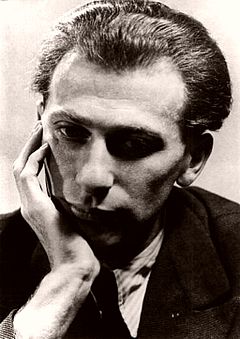Miklós Radnóti
Miklós Radnóti | |
|---|---|
 Miklós Radnóti | |
| Born | 5 May 1909 Budapest, Austria-Hungary |
| Died | 10 November 1944 (aged 35) near Abda, Hungary |
| Occupation | Poet |
| Language | Hungarian |
| Nationality | Hungarian |
| Spouse | Fanni Gyarmati |
Miklós Radnóti, birth name Miklós Glatter (5 May 1909 – 10 November 1944) was a Hungarian poet who died in The Holocaust.
Personality and early life
Radnóti was born in Budapest into an assimilated Jewish family. His life was considerably shaped by the fact that both his mother and his twin brother died at his birth. He refers to this trauma in the title of his compilation Ikrek hava ("Month of Gemini"/"Month of the Twins").
In his last years, Hungarian society rejected Radnóti as a Jew, but in his poems he identifies himself very strongly as a Hungarian. His poetry mingles avant-garde and expressionist themes with a new classical style, a good example being his eclogues. His romantic love poetry is notable as well. Some of his early poetry was published in the short-lived periodical Haladás ("Progress"). His 1935 marriage to Fanni Gyarmati (born 1912) was exceptionally happy.
Radnóti converted to Catholicism in 1943. Numerous Jewish writers converted to Christianity at that time due to the antisemitism that was pervasive in Hungarian society at the time.[1] Radnóti also admired his former professor of literature, the Piarist priest Sándor Sík.[citation needed]
In the Holocaust
In the early forties Radnóti was conscripted by the Hungarian Army, but being a Jew he was assigned to an unarmed (munkaszolgálat) ("labour battalion"). The battalion assigned to the Ukrainian front, and then in May 1944 the Hungarian Army retreated and his battalion was transferred to the copper mines in Bor, Serbia. In August 1944 as Yugoslav Partisans led by Josip Tito advanced, Radnóti's group of 3,200 Hungarian Jews was force-marched to central Hungary. On the march most of them died, including Radnóti.[2]
In these last months of his life Radnóti continued to write poems in a small notebook he kept with him. His last poem was dedicated to his friend Miklós Lorsi, who was shot to death during their death march.[1] According to witnesses, in early November 1944, Radnóti was severely beaten by a drunken militiaman who had been tormenting him for "scribbling". Too weak to continue, he was shot into a mass grave near the village of Abda in northwestern Hungary.[3] Today, a statue next to the road commemorates his place of death.
Posthumous discovery of his last works
Eighteen months after his death, the mass grave was exhumed and in the front pocket of Radnóti's overcoat his small notebook of final poems was found. The final poems are lyrical and poignant and represent some of the few works of literature composed during the Holocaust that survived. Possibly his best known poem is the fourth stanza of the Razglednicák, where he describes the shooting of another man and then envisions his own death.
Radnóti's body was later re-interred in Budapest's Kerepesi Cemetery.
Books
- Pogány köszöntő (Pagan Greeting) - 1930
- Újmódi pásztorok éneke (Modern shepherds' song) - 1931
- Lábadozó szél (Convalescent Wind) - 1933
- Újhold (New Moon) - 1935
- Járkálj csak, halálraítélt! (Walk On, Condemned!) - 1936
- Meredek út (Steep Road) - 1938
- Naptár (Calendar) - 1942
- Tajtékos ég (Frothy Sky) - 1946
- Radnóti Miklós művei (Works of Miklos Radnoti) - 1978, ISBN 963-15-1182-0
His works were translated into Croatian language by Hungarian Croat poet Stjepan Blažetin. Croatian literatury critics describe Radnóti as "the Hungarian Šimić".
References
- ^ a b Ozsváth, Zsuzsanna (2000). In the Footsteps of Orpheus: The Life and Times of Miklós Radnóti. Indiana University Press. pp. 37â40. ISBN 978-0-253-33801-3.
{{cite book}}: C1 control character in|pages=at position 4 (help) Cite error: The named reference "Ozsváth" was defined multiple times with different content (see the help page). - ^ Gilbert, Martin (2002). The Routledge Atlas of the Holocaust. Psychology Press. p. 10. ISBN 978-0-415-28145-4.
- ^ Rubin Suleiman, Susan (2006). Crises of memory and the Second World War. Harvard University Press. p. 129. ISBN 978-0-674-02206-5.
External links
- English translations of some poems, with other quotes and bio
- Book of poems in English published by Sheep Meadow Press
- Miklós Radnóti at Find a Grave
- English translations of poems by Miklós Radnóti, with a bio and comments on his work by critics and his translators
- New Documentary About the life and poetry of Miklos Radnoti
- List of famous Hungarian Jews - Miklós Radnóti
- Ozsváth, Zsuzsanna (2000). In the footsteps of Orpheus: the life and times of Miklós Radnóti. Indiana University Press. ISBN 0-253-33801-8, 9780253338013. Retrieved 2010-03-15.
{{cite book}}: Check|isbn=value: invalid character (help)
